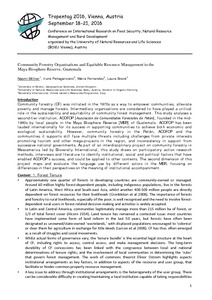Resource information
Community forestry (CF) was initiated in the 1970s as a way to empower communities, alleviate poverty and manage forests. Intermediary organisations are considered to have played a critical role in the sustainability and equitability of community forest management. This study analyses a second-tier institution, ACOFOP [Asociación de Comunidades Forestales de Petén], founded in the mid-1990s by local people in the Maya Biosphere Reserve [MBR] of Guatemala. ACOFOP has been
lauded internationally for its success in supporting communities to achieve both economic and ecological sustainability. However, community forestry in the Petén, ACOFOP and the communities it supports still face multiple threats including challenges from private interests promoting tourism and other mega-projects in the region, and inconsistency in support from successive national governments. As part of an interdisciplinary project on community forestry in Mesoamerica led by Bioversity International, this study draws on participatory action research methods, interviews and literature to identify institutional, social and political factors that have enabled ACOFOP’s success, and could be applied to
other contexts. The second dimension of this project maps and evaluate the language use by different actors in the MBR, focusing on differences in their perspectives on the meaning of institutional accompaniment .


